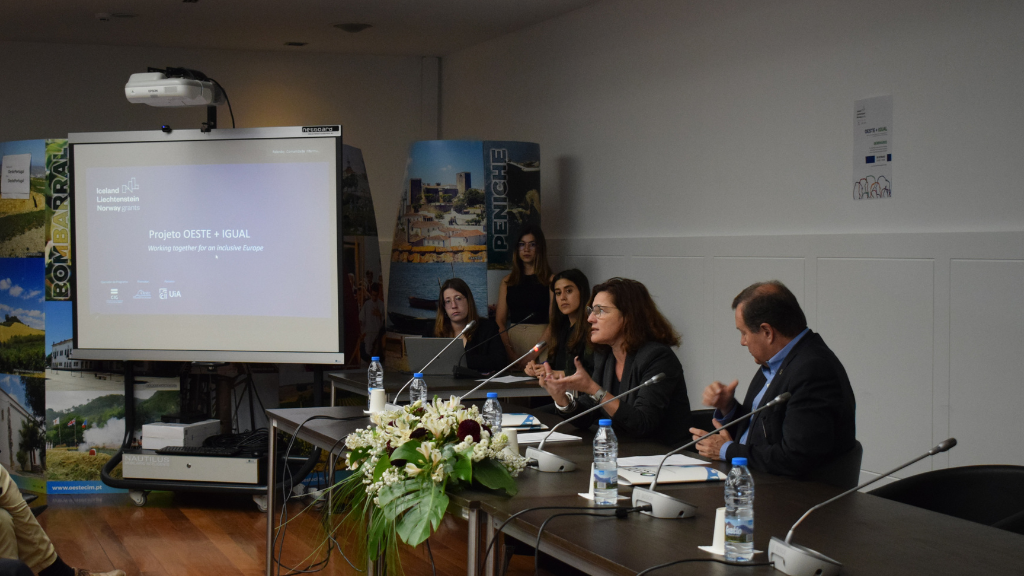As part of the Oeste +Igual Project, funded by the EEA Grants Mechanism, on May 30, a seminar was held in the West Intermunicipal Community on reconciling professional, personal and family life.
The event took place between 10 am and 12:45 pm and was divided into 2 Panels:
Panel 1 - Can the Social Partners be protagonists in conciliation policies?
Panel 2 - Conciliation as a Strategic Axis of economic development: What do people, families and territories gain from conciliation policies at Municipal and Intermunicipal levels?
The session was opened by the President of OesteCIM, Pedro Folgado, followed by Sandra Ribeiro, President of the Commission for Citizenship and Gender Equality. The President of the CIG highlighted the fact that Portugal is the only country in Europe with a specific Programme for equality, hoping that the Project leaves its mark and is incorporated into the daily practices of all the Municipalities involved so that conciliation becomes visible as an investment rather than a cost.
Panel 1, moderated by Susana Almeida Lopes (SHL Portugal), began with the acknowledgment that there was little adherence by entrepreneurs to the issue of conciliation.
For António Saraiva, former President of the Portuguese Business Confederation, conciliation has not been a priority for companies, as they are currently experiencing a moment of turbulence. However, “society as a whole has to evolve in this direction. Evolving society, we evolve each one of us, entrepreneurs, families and the entire community that the country contains in its various dimensions”.
For Mafalda Troncho, Director of the International Labor Organization – Portugal, the border between professional and family life is becoming increasingly blurred and the experience of teleworking has shown that there is an enormous interpenetration. According to the Director of the ILO, “if we look at this globalizing context and fast technological advances, we will realize that the border between professional life and family life is becoming increasingly blurred, posing great challenges to male and female workers, in difficulty in reconciling these two great dimensions in his life”. For Mafalda Troncho, “the experience of teleworking has allowed us to realize that it is not one of the best ways to reconcile personal and professional life. It is on the woman who falls most of the domestic responsibilities, being difficult to manage her profession inside the house”.
Present on Panel 1, José António Vieira da Silva, former Minister of Labour, Solidarity and Social Security, highlighted the progress achieved when introducing the mechanism to promote the sharing of parental responsibilities, in 2009.
“The introduction in the law of promoting the sharing of parental responsibilities, and the possibility for fathers to be able to use leave, allowed 50% or more of men to share parental leave (…) it was a stimulus to further extend parental responsibility, with a quick acceptance by the families. This reality is an extremely powerful path of change.”
For the former Minister, the mechanism is a small part of a broader problem related to the organization of work: “our ability to retain talent is not just paying better wages, it is also having a remuneration concept that goes beyond monetary remuneration, people stay closer to environments close to their ambitions”.
According to Vieira da Silva, the path will go through Social Contract Agreements. “without negotiation, advances will be more limited” (…) “it is necessary to overcome obstacles such as social perception and conservatism”.
At the end of Panel 1, it was time for a coffee break.
The second Panel was moderated by the Executive Secretary of OesteCIM. Paulo Simões highlighted the fact that the strategy for the Region is focused on people and presented the analytical platform for territorial management, Smart Region, which “will collect information to improve people's quality of life and create public value”.
In Panel 2, Sandra Ribeiro referred: “the issue of conciliation has gained ground in the public debate, increasingly beginning to be seen as a management instrument”. The President of the CIG added: “the issue of conciliation without the support of public policies, it will be difficult to “take the leap”. It cannot be just the State that bets on this matter, the social partners are fundamental.”
For Sandra Ribeiro, it is important to listen to workers and understand what they need.
Panel 2 had the intervention of Sónia Fertuzinhos (SHL Portugal). The Senior Consultant referred to the results of the Diagnostic Survey carried out within the scope of the Project and which revealed that one of the obstacles to conciliation in the Region is related to the difficulty for men to use their rights in parenting in the context of companies, families and in the social context.
Sónia Fertuzinhos highlighted the importance of moving from a social perspective to an economic perspective in the face of equality and conciliation: “the issue of conciliation and equality has an impact on the ability to create wealth in countries and companies.”
Equality is reflected in the GDP, being a factor that leverages the productive potential of the population, increasing employment rates and competitiveness.
